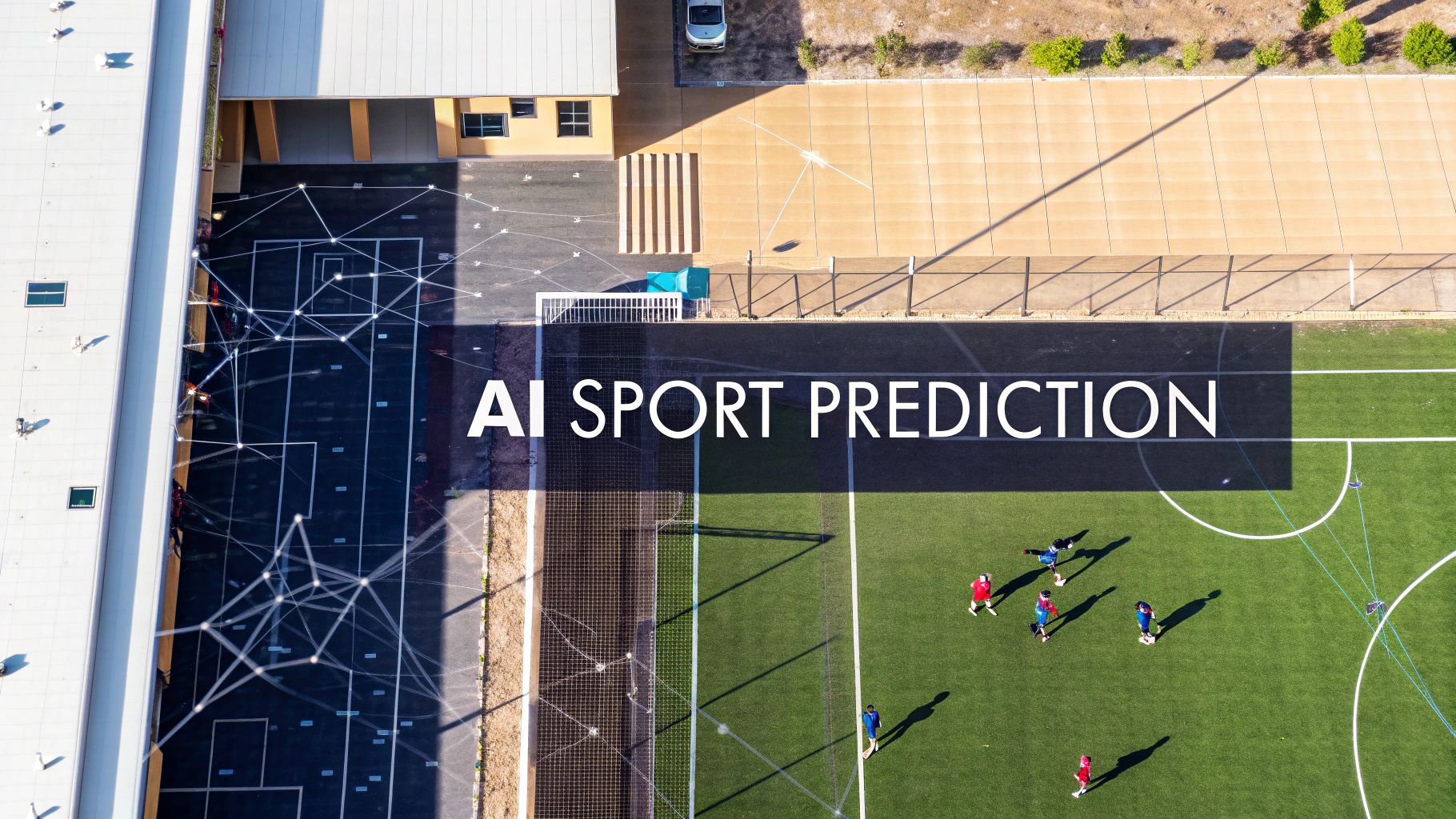
AI Sport Prediction Your Ultimate Football Betting Edge
Discover how AI sport prediction is revolutionizing football betting. Our guide explains AI models, data-driven insights, and strategies to improve your odds.
Think of an AI sport prediction model as having a master analyst on your side—one that's meticulously studied every single match, player, and tactical tweak to call a game's outcome with more precision than ever before. It's about gaining a data-driven edge by crunching millions of data points to spot patterns a human eye would almost certainly miss.
The New Game Plan for Football Prediction
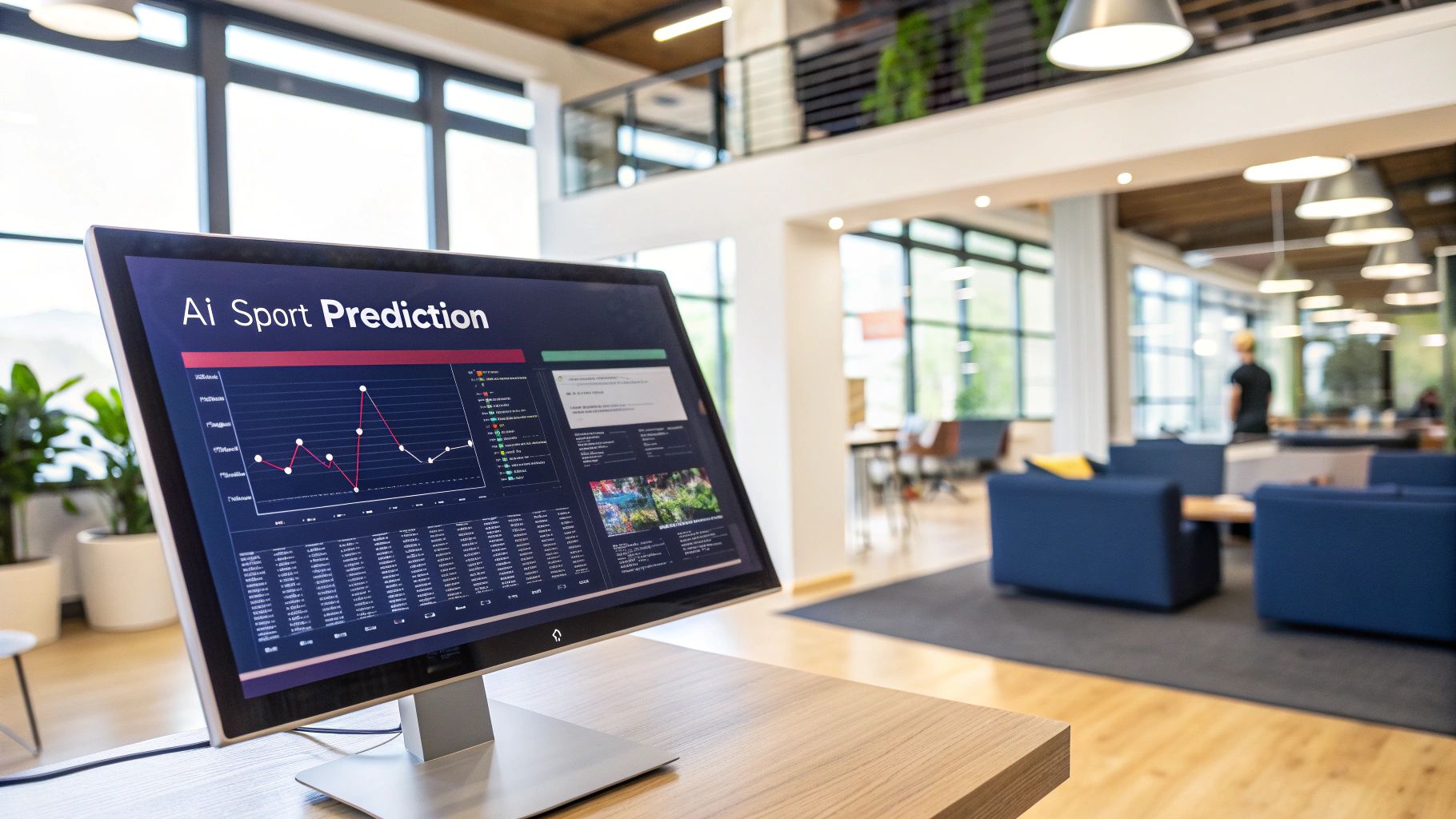
It’s time to move past gut feelings and the usual back-and-forth from televised pundits. We're stepping into a new arena where artificial intelligence is handing us a powerful analytical advantage for predicting football matches. This isn't just a small step forward; it's a complete rethink of how we approach sports betting and analysis.
At its heart, an AI prediction system works like a tireless researcher. It digs through enormous piles of data, picking out subtle trends and connections that are practically invisible to us. This turns a mountain of raw information into clear, actionable insights for everyone from the casual fan to the seasoned bettor.
Moving Beyond Human Bias
Let's be honest, one of the biggest hurdles in traditional prediction is our own bias. We all have our favourite teams, players we root for, and memorable past results that stick in our minds and cloud our judgement. AI doesn’t have that problem. It operates without emotion or loyalty, focusing purely on the hard evidence in the numbers.
This completely objective take gives a far more realistic view of what’s probable, helping you make smarter, more consistent decisions. The idea isn't to replace your football knowledge, but to supercharge it with an unbiased, data-first perspective.
By removing emotion from the equation, AI models focus purely on the patterns and probabilities hidden within the data. This leads to more objective and often more accurate forecasts over the long term.
It's easy to see how the two approaches differ. The old way relies on intuition and a limited slice of data, while the new way is all about deep, objective analysis.
Traditional Punditry vs AI Sport Prediction
Aspect | Traditional Punditry | AI Prediction |
|---|---|---|
Data Scope | Recent form, key players, personal opinion. | Millions of historical data points, from player stats to weather. |
Bias | Highly susceptible to emotion, team loyalty, and narrative. | Completely objective and data-driven; no emotional bias. |
Analysis | Based on human observation and gut feeling. | Complex statistical modelling and machine learning algorithms. |
Speed | Limited to human capacity for research and analysis. | Processes vast amounts of data in seconds. |
Adaptability | Opinions change slowly, often influenced by recent "big" results. | Models learn and refine their accuracy with every new match result. |
Outcome | General predictions, often focused on entertainment. | Specific probabilities for various outcomes (e.g., win, draw, lose, score). |
The table really drives home the point: AI brings a level of depth and objectivity that human analysis just can't match on its own.
Key Advantages of an AI Approach
Bringing AI into your strategy gives you a few clear advantages that leave older methods in the dust. It's all about getting a much sharper picture of what's likely to unfold on the pitch.
Deeper Analysis: AI can juggle thousands of variables for a single match. We’re talking player form, expected goals (xG), tactical matchups, and more, creating a complete 360-degree view.
Pattern Recognition: It’s incredible at spotting recurring patterns that stretch across seasons and leagues—the kind of stuff that would take a human analyst years to piece together, if ever.
Adaptability: These models aren't static. They constantly learn from new results, sharpening their accuracy with every single match that gets played.
Ultimately, this data-driven method gives you a more disciplined and structured way to approach football betting.
How AI Decodes the Beautiful Game
So, how does an AI actually go from a mountain of raw data to a single, confident match prediction? It’s not about waving a magic wand. Instead, think of it like a team of specialist analysts, each with a different expertise, working together to build a complete picture of what’s likely to happen on the pitch.
It all boils down to feeding specific data into sophisticated models that learn, adapt, and ultimately produce remarkably accurate forecasts.
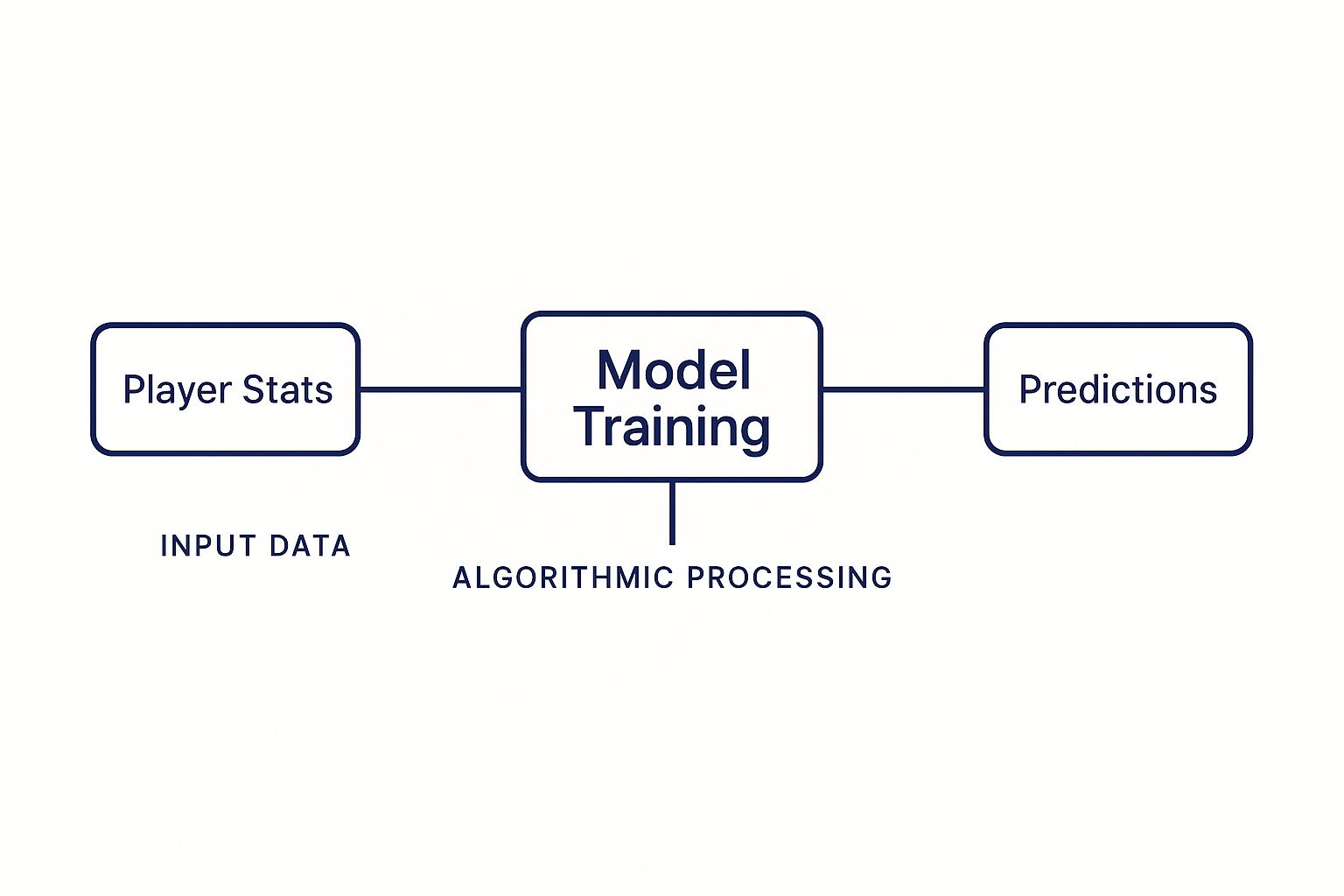
This visual breaks it down nicely. We start with raw player stats and match data, run it through the training algorithms, and out come the predictions you see. To get there, the AI leans on a few core methods.
Expected Goals Analysis
One of the most powerful tools in the AI's arsenal is Expected Goals (xG). This metric goes way beyond just looking at the final score. Instead, xG analyses the quality of every single shot taken in a game. It asks a simple but crucial question: based on thousands of similar shots from the past, what was the real probability of that specific attempt ending up in the back of the net?
A speculative shot from 30 yards out might get an xG of 0.02 (basically a 2% chance), whereas a simple tap-in right in front of an open goal could be as high as 0.85 (an 85% chance). By tallying up the xG for every shot a team takes, the AI gets a much clearer picture of who truly deserved to win, regardless of what the scoreboard said.
Imagine a team loses 1-0 but racked up an xG of 3.2 compared to their opponent's 0.5. That tells you they were incredibly unlucky and are probably a strong bet to bounce back. You can dive deeper into how we use these models by exploring how our AI system works.
Form and Momentum Analysis
Next up, the AI plays the role of a team psychologist, digging into form and momentum. This is far more sophisticated than just looking at a "W-W-L-W-W" streak. The system cares about the story behind those results. Was a team just scraping by with fortunate 1-0 wins, or were they systematically dismantling their opponents?
The model considers factors like:
Recent Performance: Not just wins and losses, but how they’ve performed over the last 3, 5, and 10 games.
Strength of Schedule: Were those recent victories against top-of-the-table giants or teams battling relegation?
Performance Trends: Is the team’s attack getting sharper over time, or is their defence starting to look a bit leaky?
This gives the AI a feel for a team's current rhythm and confidence—two massive, often overlooked, drivers of future performance.
Tactical Matchup Analysis
Finally, the AI becomes a master tactician. This is where it simulates the match before it even kicks off, predicting how one team’s style will fare against another’s. It’s like a game of virtual chess, but with terabytes of data.
Will a side that loves to press high get caught out by an opponent that excels at long, direct balls? How will a team that attacks down the wings cope with a narrow, compact defensive block? By sifting through thousands of similar historical matchups, the AI can make a highly educated guess about which team’s strategy is more likely to come out on top.
This approach has proven incredibly effective. In Romania, for instance, AI sport prediction models focused on the top-tier Liga I have hit an average win rate of around 66%. This isn't just a number; it’s a figure that outshines many human pundits, showing why data-driven forecasting is gaining so much trust among local analysts and fans alike.
By weaving together these three layers—shot quality, current momentum, and the tactical battle—the AI creates a view of the match that is nuanced, multi-dimensional, and far more insightful than what you can see on the surface.
The Data Fuelling Smarter Predictions
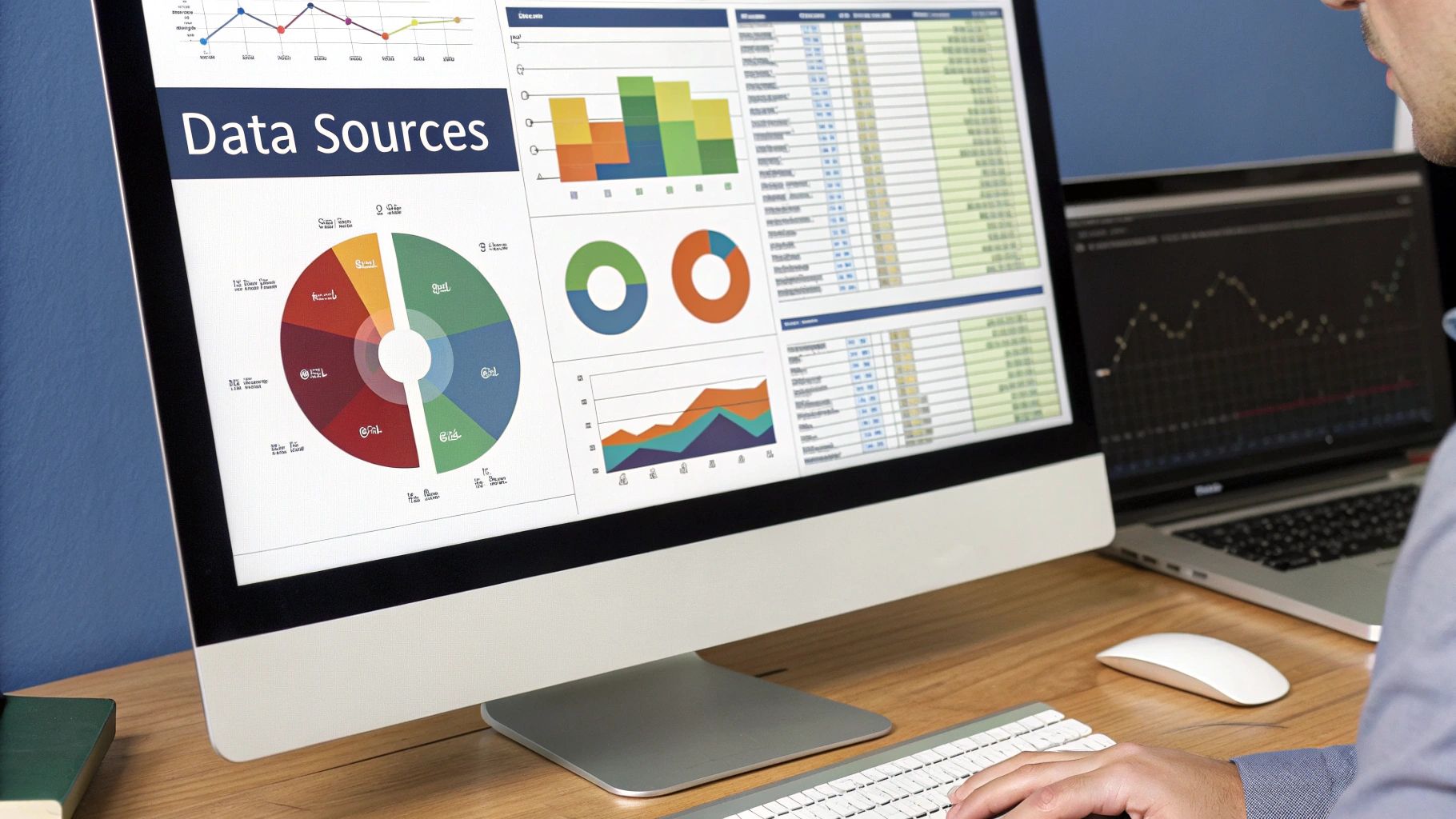
Think of an AI sport prediction model like a high-performance engine. What you put in the tank dictates what you get out on the track. In our world, that fuel is data—mountains of it, all granular, relevant, and constantly refreshed. Without a steady flow of high-quality information, even the most sophisticated algorithm is just taking a shot in the dark.
The real gap between a basic prediction tool and one that actually gives you an edge lies in the depth of its data. Simply looking at past scores and league tables is old news. Modern AI has to dig much, much deeper to understand the tiny details that swing a football match.
It’s all about moving beyond the final whistle and into the nitty-gritty of performance metrics.
Beyond the Scoreboard
To make genuinely insightful predictions, an AI needs to grasp the how and why behind every result. This means tapping into datasets that the average fan never sees. The best platforms are constantly fed a diet of detailed, real-time information.
We’re talking about things like:
Player Positioning Data: Knowing where every player is at any given second helps the AI analyse defensive shapes and spot patterns in attacking runs.
Passing Metrics: It's not just about completing a pass, but doing it under pressure. This tells you a lot about a team's composure.
Defensive Actions: Tracking tackles, interceptions, and clearances gives a clear picture of a team's resilience at the back.
Advanced Analytics: Metrics like Expected Goals (xG) are now fundamental. If you're new to the concept, you can get the full rundown on understanding how xG works in betting.
This level of detail lets the AI build a proper, multi-layered picture of a team's DNA. It can flag a team that’s been lucky and is overperforming its stats, or spot one that’s about to hit a rich vein of form.
It all boils down to a simple principle: the more high-quality, relevant data an AI can learn from, the sharper its predictions will become. This is why official, real-time data feeds are a must-have for any serious prediction platform.
This is especially critical when you're looking at specific regional leagues, where local insights are gold. Take Romania’s Liga I, for example. The use of AI for forecasting matches has exploded, with some platforms hitting prediction confidence scores that top 80%. How? By feeding the models hyper-localised data on team form, player injuries, and the unique tactical setups you only see in Romanian football.
Through partnerships with data providers like Genius Sports, AI systems can get real-time data from over 3,000 Liga I matches each year. This has led to a 20-30% jump in user engagement compared to the old-school methods. You can read more about how these data deals are changing the game across Europe on Sportspro.com.
At the end of the day, data quality is the bedrock. Every reliable AI sport prediction is built on it.
Real-World Benefits for Your Betting Strategy
Knowing how an AI sport prediction model works is interesting, sure. But the real magic happens when you see how it can directly sharpen your betting strategy. This is where theory hits the turf and delivers tangible advantages that can genuinely change how you look at every match.
The most powerful benefit? It saves us from ourselves. Let’s be honest, we all have our favourite teams and players. That loyalty can be a blind spot, pushing us toward emotional bets that fly in the face of cold, hard data. An AI couldn’t care less about team colours or historic rivalries; its analysis is completely detached and objective.
Picture this: your club is playing a massive game at home. Your heart is screaming to back them for the win. But the AI flags a critical weakness—their abysmal defensive record against teams that play a fast counter-attacking game. That single, data-driven insight is the reality check that can stop a bad bet in its tracks and steer you towards a much smarter, calculated move.
Eliminating Emotional Bias
This kind of objectivity is a complete game-changer. Think of an AI-powered system as your rational co-pilot, grounding every decision in statistical probability rather than gut feeling or wishful thinking. It’s the steady hand that stops you from chasing losses after a tough beat or getting carried away during a hot streak.
By sticking to a data-first approach, you naturally build a more disciplined and sustainable betting routine. It’s not about taking the passion out of the sport; it’s about funnelling that passion through a filter of pure logic and evidence.
The core advantage of AI in betting is its ability to remain unbiased. It systematically identifies value and risk without the emotional baggage that often leads human bettors astray, promoting greater long-term consistency.
And that consistency is the foundation of any successful strategy. It helps you protect your bankroll and simply make better choices, week in and week out.
Uncovering Hidden Value Bets
Beyond just weeding out the poor decisions, AI is incredible at finding opportunities the average punter completely misses. Most human analysts and even bookmakers are focused on the big leagues and obvious storylines. This means plenty of other matchups and bet types get overlooked or, even better, undervalued.
An AI, on the other hand, never gets tired. It relentlessly sifts through thousands of data points across countless markets to spot those hidden gems.
This is how it finds an edge:
Underrated Teams: It might spotlight a team whose underlying performance stats (like xG) are way stronger than their recent string of results would suggest. That’s a classic signal for a potential upset.
Niche Markets: AI can find fantastic value in less glamorous bets, like corner counts or specific player props, which are often mispriced by bookies.
In-Play Opportunities: It processes live-game data faster than any human ever could, flagging sudden shifts in momentum that create fleeting moments of incredible value.
These are the kinds of insights that separate casual betting from a serious strategy. You can dive deeper into this topic in our detailed guide on maximizing value bets with AI.
Personalised Insights and Market Growth
The impact of AI is becoming clear on a much larger scale, too. In markets like Romania, for example, AI-driven personalisation is making a huge difference in how users engage with betting platforms. AI systems can suggest bets based on an individual's past behaviour, with some models hitting win rates of around 66% on football matches.
This approach has helped platforms grow revenues by an estimated 20-30%, all by creating a smarter and more secure experience for their customers. You can read more about how AI is shaping sports betting.
How to Choose the Right AI Prediction Platform
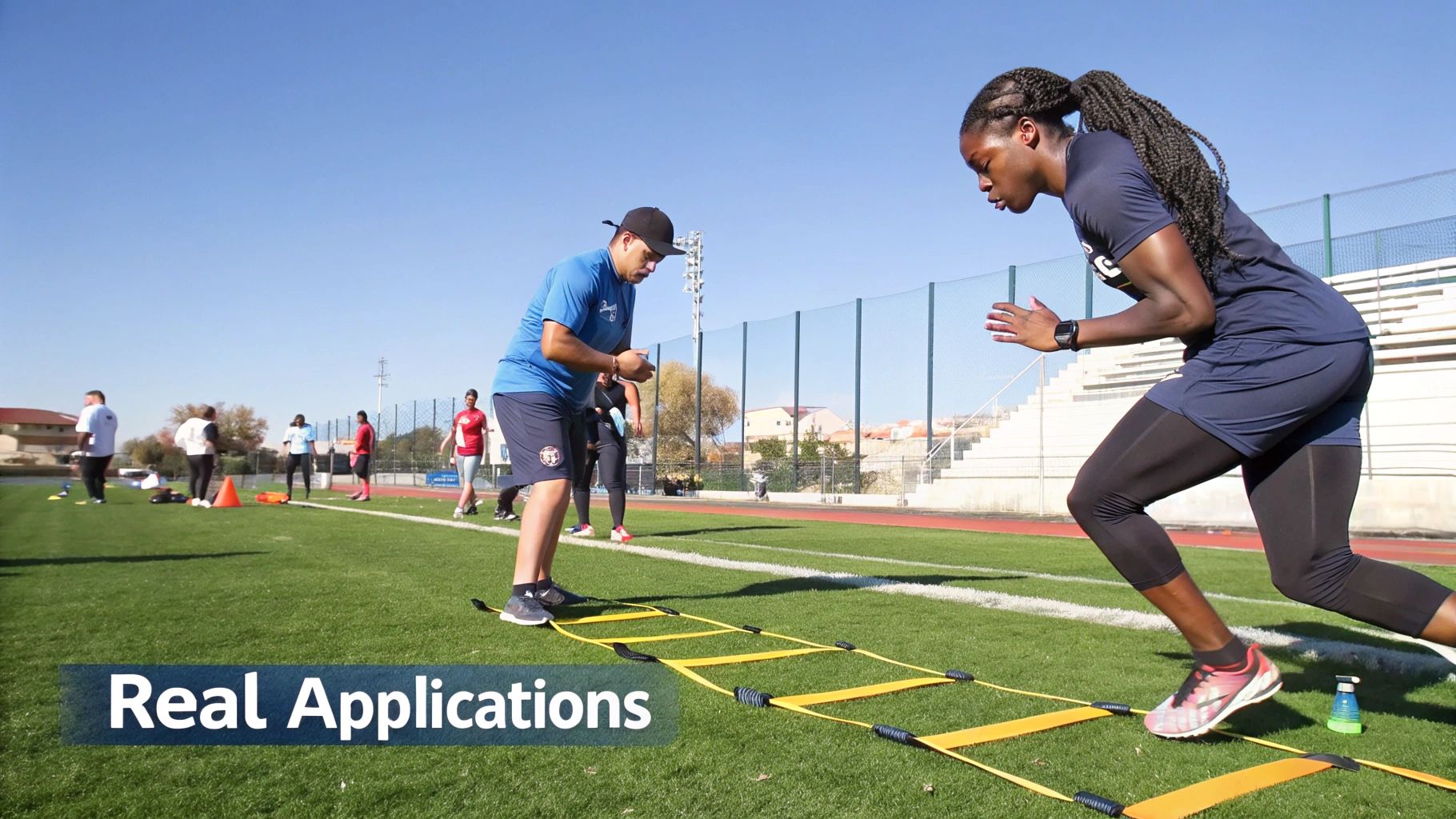
With the boom in AI sport prediction, new tools are popping up everywhere. But let's be honest, not all of them are created equal. Some offer genuinely sharp, data-backed insights, while others are just digital tipsters hiding behind fancy tech talk. If you want a platform that actually gives you an edge, you need to know what separates the wheat from the chaff.
Think of it like hiring a financial advisor. You wouldn't trust your money with someone who won't explain their investment strategy or show you their past performance. The same logic applies here. You’re looking for a reliable partner that gives you clear information, not some black box that just spits out random picks.
Making the right choice really boils down to checking a few key things that tell you whether a platform is the real deal or just another pretender.
Look for Methodological Transparency
The first, and most important, question you should ask is: how did the AI get here? A platform worth its salt will be upfront about its methods. It should explain the core models it uses, whether that’s Expected Goals (xG), deep tactical analysis, or momentum tracking.
You don't need a PhD in data science to get it, but you absolutely deserve to understand the logic behind the predictions. If a service just tells you to bet on a team without any explanation... that’s a massive red flag. Real transparency builds trust and helps you understand where the system shines and where its blind spots might be.
A platform that explains its reasoning is a partner in your strategy. A platform that hides its methods is just a digital fortune cookie. Always choose the partner.
This kind of clarity is what lets you blend the AI's insights with your own knowledge, which is how you start making truly smart decisions.
Evaluate Data Quality and Accuracy
An AI is only as good as the data it eats. A top-tier platform will be powered by high-quality, real-time data from official sources, pulling in a huge range of performance stats. This ensures its predictions are based on the freshest, most accurate information out there, from last-minute lineup changes to live in-game metrics.
Just as crucial is a proven track record. The best services aren't shy about showing their performance over time. Look for platforms that openly share historical data on their win rates or return on investment. Vague promises of "high accuracy" are meaningless without cold, hard numbers to prove it.
Prioritise User Experience and Support
At the end of the day, the tech should make your life easier, not more complicated. A great AI sport prediction platform takes all its complex analysis and presents it in a way that’s simple and intuitive. The insights need to be easy to grasp and act on, whether you've been betting for years or are just starting out.
Look for a few key things:
Clear Dashboards: The information should be well-organised and easy to find. No digging required.
Plain-English Explanations: The 'why' behind each pick should be explained without confusing jargon.
Responsive Support: If you get stuck or have a question, you need to know someone is there to help.
Ultimately, you want a tool that saves you time and cuts through the noise. It should free you up to focus on what really matters: making confident, data-driven decisions.
Got Questions About AI Sport Predictions? We've Got Answers
Stepping into the world of AI sport prediction is exciting, but let's be honest, it also brings up a lot of questions. It's totally normal to wonder how this all works and what it actually means for the bets you place. Let’s tackle some of the most common queries head-on so you can feel confident in what you're doing.
The big one everyone asks first: does using AI guarantee I'll win? The short answer is no. Sports are unpredictable by nature—that’s why we love them! No system on earth, whether it's a supercomputer or the sharpest human mind, can promise a 100% win rate. The real power of AI isn't about finding a magic bullet; it's about shifting the odds in your favour, consistently, over the long term.
Think of it like a professional poker player. They don’t win every hand, but they use skill and probability to make smart decisions that pay off over time. AI brings that same analytical edge to sports betting, taking you way beyond gut feelings or simple luck.
Do I Need to Be a Tech Genius to Use This?
A lot of people think you need a degree in data science to make sense of AI-powered tools. Thankfully, that couldn't be further from the truth. The best platforms are built for regular people, not programmers. They do all the heavy lifting—the complex data crunching—and then serve you the result on a silver platter.
You don't need to know a thing about algorithms. Your role is to look at the final output: the prediction, the confidence level, and the simple, clear reasoning behind it. All the hard work is already done.
A good AI platform isn't meant to make things more complicated; it’s meant to make them simpler. It should feel like getting a tip from an expert who can tell you why a pick makes sense in just a few seconds.
This approach makes it possible for anyone, no matter their technical skill, to bring a data-driven mindset to their betting strategy.
How Does AI Deal With the Chaos of a Live Match?
Okay, but what about those wild moments that make football so exciting? A shock red card, a bizarre own goal, a last-minute penalty—how can a machine possibly account for that? This is actually where a well-built AI sport prediction model really proves its worth. While it can’t predict a specific player will get sent off at the 73rd minute, it can calculate the probability of those chaotic events happening and factor that risk into its analysis.
A smart system is built to handle the natural messiness of a match. It knows how a red card for a team's star defender statistically changes the game's entire dynamic.
Here’s a peek behind the curtain:
Before Kick-Off: The AI looks at things like a team's disciplinary record and even the referee's history to assess the general risk of cards.
Live Game Adjustments: The most sophisticated models can even adjust their calculations in real-time as a match unfolds, reacting to game-changing events.
It's All About Probability: At the end of the day, the AI is figuring out which teams are built to withstand chaos and which ones are more likely to cause it.
This means the AI's predictions are robust. They aren't thrown off by a single moment of drama because the potential for randomness is already baked into the equation. That’s how you get insights you can truly rely on.
Ready to stop guessing and start making data-driven decisions? Join OddsHaven and get daily AI-powered football picks delivered straight to you. Discover your edge today at https://www.oddshaven.ai.
Ready to Start Winning?
Join OddsHaven and get instant access to AI-powered predictions with an 87% win rate on high-confidence picks
Try OddsHaven Free for 5 Days

